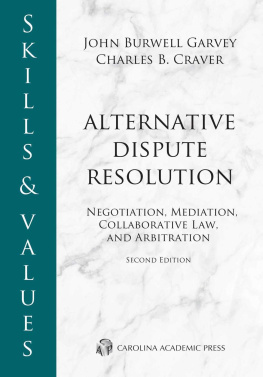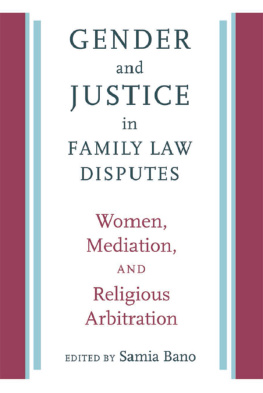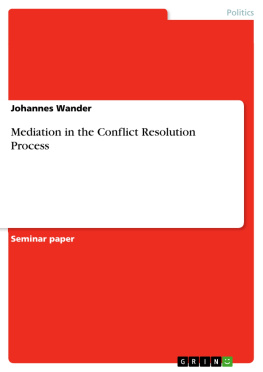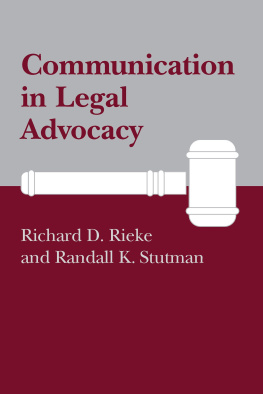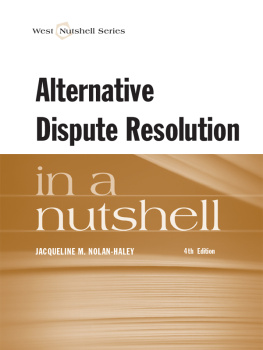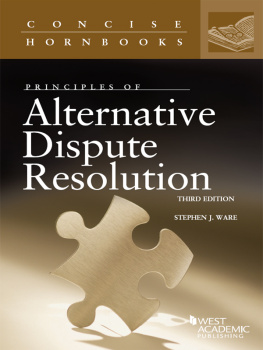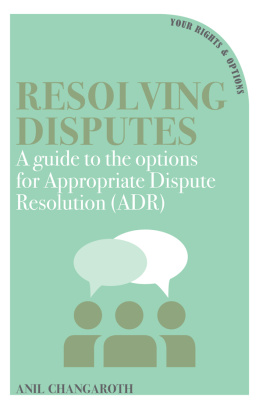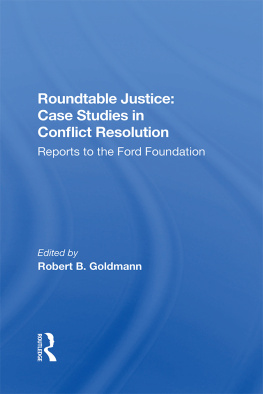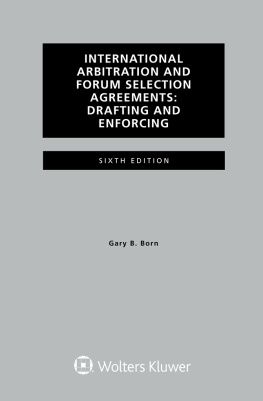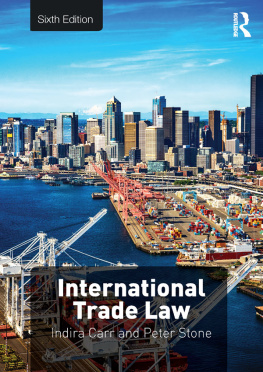Skills & Values
Alternative Dispute Resolution
Carolina Academic Press
Skills & Values Series
________________
David I. C. Thomson, Series Editor
Skills & Values: Administrative Law
Alfred C. Aman, Jr. and William Penniman
Skills & Values: Alternative Dispute Resolution:
Negotiation, Mediation, Collaborative Law and Arbitration
Second Edition
John Burwell Garvey and Charles B. Craver
Skills & Values: Civil Procedure,
Second Edition
Catherine Ross Dunham and Don C. Peters
Skills & Values: Constitutional Law
William D. Araiza, Thomas E. Baker, Olympia Duhart,
and Steven I. Friedland
Skills & Values: Contracts,
Second Edition
William J. Woodward, Jr. and Candace M. Zierdt
Skills & Values: Criminal Law
Andrew Taslitz, Lenese Herbert, and
Eda Katharine Tinto
Skills & Values: Criminal Procedure
Susan L. Kay and William Cohen
Skills & Values: Discovery Practice,
Third Edition
David I. C. Thomson
Skills & Values: Evidence,
Second Edition
John B. Mitchell and Rick T. Barron
Skills & Values: Family Law
Justine A. Dunlap
Skills & Values: Federal Income Taxation
Michelle L. Drumbl and Deborah S. Kearns
Skills & Values: Intellectual Property
Courtney G. Lytle
Skills & Values: Lawyering Process:
Legal Writing and Advocacy,
Second Edition
David I. C. Thomson
Skills & Values: Legal Negotiating,
Fourth Edition
Charles B. Craver
Skills & Values: Property Law
Brian D. Shannon and Gerry W. Beyer
Skills & Values: The First Amendment,
Second Edition
Charles W. Rhodes and Paul E. McGreal
Skills & Values: Torts
Christine Ver Ploeg and Peter B. Knapp
Skills & Values: Trusts and Estates
Roger W. Andersen and Karen Boxx
Skills & Values
Alternative Dispute Resolution
Negotiation, Mediation, Collaborative Law,
and Arbitration
SECOND EDITION
John Burwell Garvey
Professor of Law emeritus
University of New Hampshire
Franklin Pierce School of Law
Charles B. Craver
Freda H. Alverson Professor
George Washington University Law School

Copyright 2021
Carolina Academic Press, LLC
All Rights Reserved
Library of Congress Cataloging-in-Publication Data
Names: Garvey, John Burwell, author. | Craver, Charles B., author.
Title: Skills & values. Alternative dispute resolution : negotiation, mediation, collaborative law, and arbitration / by John Burwell Garvey, Charles B. Craver.
Other titles: Alternative dispute resolution
Description: Second edition. | Durham, North Carolina : Carolina Academic Press, 2021. | Series: Skills & values series
Identifiers: LCCN 2021017696 (print) | LCCN 2021017697 (ebook) | ISBN 9781531022921 (paperback) | ISBN 9781531022938 (ebook)
Subjects: LCSH: Dispute resolution (Law) United States Problems, exercises, etc. | Negotiation in business United States Problems, exercises, etc. | Communication in law United States Problems, exercises, etc.
Classification: LCC KF9084 .G37 2021 (print) | LCC KF9084 (ebook) | DDC 347.73/09 dc23
LC record available at https://lccn.loc.gov/2021017696
LC ebook record available at https://lccn.loc.gov/2021017697
Carolina Academic Press
700 Kent Street
Durham, NC 27701
(919) 489-7486
www.cap-press.com
Printed in the United States of America
Contents
Acknowledgments
There are many people who helped prepare this book and we appreciate it. In particular, we thank the Daniel Webster Scholars of the University of New Hampshire Franklin Pierce School of Law Class of 2013 and the UNH law students taught by Professor Melinda Gehris, who field tested the first edition, and all subsequent Webster Scholars who have provided feedback on a yearly basis.
Preface
1. This Book Is Your Book
This book was written primarily for law students. If you are like most students, you bought it because it was assigned by your professor. You just paid good money and would like to know what you can hope to get for it. That is a fair request, and we will try to give you a clear answer.
But first, if you are using this book for a course involving any aspect of alternative dispute resolution, including negotiation, mediation, collaborative law, and arbitration, we commend you on your course selection! You probably signed up for the course because you were interested in learning the subject. We think this is a smart decision on your part. Although nearly all lawyers are repeatedly involved in some way with aspects of alternative dispute resolution, most law schools do not require any training. If you apply yourself, we predict that this will be one of the most useful courses you take in law school. Please let us know if you agree after you have been in practice for a few years. We would like to hear from you.
2. What You Can Get from This Book
This book is designed to give you both theory and practical application for the skills and values which come into play during the various forms of alternative dispute resolution, including negotiation, mediation, collaborative law and arbitration. This book is not intended to be the last word on alternative dispute resolution theory, although it will direct you to lots of further discussion. It is not intended to be a comprehensive treatise on the law and specific rules. Your professor may choose to use it as a practical supplement to a standard text or as a stand-alone course book. This book is designed to provide a practical, hand's on experience so that you can practice and reflect upon what you will be doing as a lawyer. Think of it as practice practice! Each chapter focuses on a different aspect of the dispute resolution process. The idea is to read the material and then test and develop your knowledge through exercises and simulations. Some of the hands-on materials are in the book, some of them are online, and some of them will be distributed by your professor. When the material is online, your professor will tell you how to access the materials for the chapter you are reading. After each experience, you will be given an opportunity to evaluate and reflect upon your performance. If you work through the exercises before you peek at the self-study sections, you will get more out of the experience.
The online materials for this book provide supplemental reading and reference materials. In addition, there are online videos. You can watch examples of lawyers doing the various things that are discussed in the book. There are some commentaries by us further discussing the materials and links to other video commentaries. We encourage you to read each chapter in conjunction with the online materials for that particular chapter, since the online materials are intended to complement the reading.
3. The Power of Reflection
Many attorneys go from case to case without ever reflecting on what they learned from the interactions. Most people who do not reflect do not improve and are doomed to make the same mistakes over and over. During this course, you have an opportunity to practice good habits by reflecting after each exercise. By doing this consciously in the beginning, you can train yourself to internalize the process and do it even without realizing that you are doing it. This will make you a more intentional lawyer and you will actually be able to observe and mark your progress. Your results will be consistently better, your career will be more rewarding and your clients will be better served.

